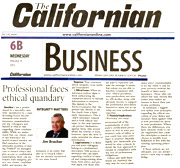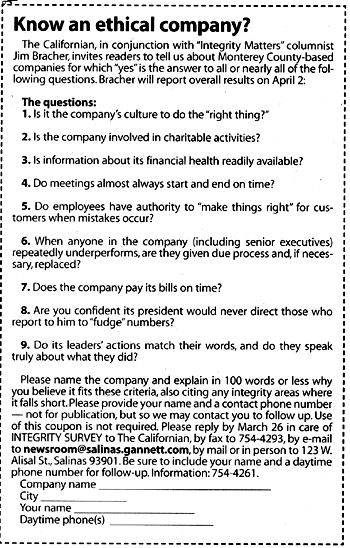Integrity
Matters
February 26, 2003
Professional
faces ethical quandary
  Question: (E-025) I am a professional in a specialty
that is carefully, monitored by a state licensing board.
Recent demands from health insurance organizations now
put my colleagues and myself at ethical risk regarding
client confidentiality. While we understand that our clients
want to use insurance for health related service, we find
ourselves in the untenable position of feeling "bullied"
by managed care to breach ethics and give access to confidential
information. How can we behave with integrity, protect
our client’s confidentiality and answer the demands
of an entity that asks us to breach ethics that are already
monitored by our state board?
Question: (E-025) I am a professional in a specialty
that is carefully, monitored by a state licensing board.
Recent demands from health insurance organizations now
put my colleagues and myself at ethical risk regarding
client confidentiality. While we understand that our clients
want to use insurance for health related service, we find
ourselves in the untenable position of feeling "bullied"
by managed care to breach ethics and give access to confidential
information. How can we behave with integrity, protect
our client’s confidentiality and answer the demands
of an entity that asks us to breach ethics that are already
monitored by our state board?
 Response: Your concerns about integrity cross multiple
boundaries.
Response: Your concerns about integrity cross multiple
boundaries.
-
Ethical
issues: When an informed patient signs a form authorizing
the counselor/doctor to furnish information to insurers,
this signals to the doctor/counselor that the patient
has chosen to utilize funds from a third party (insurance).
This is called informed consent and is both ethical
and legal. In this way insurers can protect themselves
against those who would abuse the system. It does, however,
open the door to some potential for abuse of information.
-
Legal
concerns: It is likely that you and your colleagues
belong to a professional association with access to
attorneys who can assist regarding conflicts of interest
and compromising situations. Seek advice and provide
input, lest those who are paid to represent you miss
the message. It seems that unless you are able to function
(consistent with your ethical priorities), your productivity
and service will decline, along with adequate income
to support the professional association founded to assist
you in the carrying out your professional expertise.
-
Financial
implications: Obviously, you must understand all
of the requirements of your state's certification procedures
as well as your profession or you could lose your privileges
to practice. Morally, legally and financially you would
be wise to know, in detail, the best approach to remain
in compliance with any and all professional obligations.
Unless
or until these issues are resolved, the only way for you
to guarantee strict confidentiality is for the client
to pay for your services without the benefit of third
party insurance. Those who can afford this may choose
this rather than enable an insurer to know their particular
problems.
In
summary, I suggest you to define your principles regarding
the ethical execution of your duties and measure them
against what is now provided for those in your profession.
Where there are differences, you have choices: work to
create regulations that cause the principles to match
or choose to modify your behaviors to live with the existing
operating principles.
If
these options are not adequate, you can always select
a new way to make a living.
"Coupon"
published February 26 with the Integrity Matters
column

JIM
BRACHER is founder of the Bracher Center for Integrity
in Leadership in Monterey. His column, "Integrity
Matters," appears Wednesday on the Business page.
Readers are invited to submit questions on business-related
ethics and values. Please write in care of INTEGRITY to
newsroom@salinas.gannett.com. The center's Web site is
www.brachercenter.com.
<<
back to Integrity Matters
main page
Home
Page | About Us | Ask
Bracher | Services |
Resources | Contact
Us
|